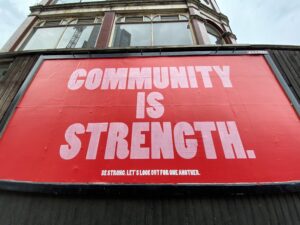How Can We Create an Equitable and Sustainable Future of Work?
Welcome to the last of this Brace for Impact newsletter series on the future of work. As countries begin to reopen their economies and offices, we can see proposals for a shorter work week and a hybrid workplace making headlines. Among workers who were able to work from home last year, many are ambivalent about returning to “business as usual”: a Harvard Business School survey found that 80% of workers either don’t want to return to the office or prefer a hybrid schedule.
From Spain to Scotland and even Japan, some countries are considering the long-term implementation of a shorter work week. Still some companies are adopting five-day work weeks, but limiting the number of work hours per day to just five, citing the limitation of the average person’s concentration ability. Today, 86% of Iceland’s working population have shifted to a shorter work week, before the official report of the four-day work week trial, launched in 2015, was even released.
But what about workers who simply cannot afford to work a shorter work week, or for whom a hybrid workplace is not practical? Is the number of work hours or workdays the right measurement of performance if our goal is to improve employee autonomy and wellbeing, and subsequently, building better communities? How can countries build a sustainable and equitable universal social protection program, so that society as a whole will have the resilience needed for future crises and disasters? If we want to build back better, we must be mindful to not leave anyone behind. Read on and let us know your thoughts!

Shorter Work Week
The idea of a shorter work week has been gaining popularity in recent years, and the COVID-19 pandemic, which set the stage for the biggest global work-from-home experiment, has led to business leaders and trade unionists demanding their national leaders to adopt a four-day work week.
According to Andrew Barnes, who successfully led a transition to a four-day work week at his trustee company in New Zealand, the remote-work arrangement during the pandemic has shown employers that it is possible to measure productivity in terms of outputs, instead of just facetime and the number of hours spent in the office. Barnes found that, when employees are given more time in the week to attend to non-work responsibilities, they tend to be more productive in the work week.
The author of this Atlantic article is right in pointing out that while a four-day work week probably isn’t going to fix issues such as low income and general job dissatisfaction, anecdotal evidence suggests that it does make people feel less stressed and less strapped for time, thereby improving their physical and mental health. It makes sense, as people would then have more time to devote to their passion projects, spend time with their loved ones, or do household chores – “human” things that are usually hurried through or sidelined during the two-day weekend.

Hybrid Workplace
With physical distancing rules, we saw a drastic reduction in in-person meetings and events, and that has affected many industries and sectors, especially social impact organizations whose financial stability hinges largely on fundraising and other in-person events.
There was the loss of physical touch and in-person meetings and events, but when the pandemic forced us to work remote, we went to great lengths to stay connected regardless. In fact, we were able to utilize digital platforms to connect with more people from more places around the world. One of our partner companies, Hollo, an AI-powered mental health platform, was able to utilize technology platforms to schedule more meetings with clients and partners. Conferences, events, and webinars that were once restricted by geographical locations were able to reach an international audience, as was the case with GREEN Hospitality, another of our partner companies. While the technology to connect people has been in existence for a while, people were taking the pandemic as an opportunity to check in on their family and friends overseas.
Working from home has blurred the work/life boundaries and increased working hours for many, but it has also afforded us a more flexible schedule throughout the work week. Proponents of the physical workplace argue that remote work undermines collaboration, but really, there is no proof that unplanned social interactions in the physical workplace boost creativity. But Zoom fatigue is real, so is the loneliness felt from social isolation.
And so from the pandemic-necessitated work-from-home arrangement, workers have come to desire a hybrid workplace – one that combines home-working with opportunities to network, collaborate, and socialize in person. This is backed by the World Happiness Report 2021, which found that as the pandemic worsened in the US, employee wellbeing became highly dependent on flexibility of work schedules and good communication with their managers or supervisors. The same report finds that, in the UK, social connection was the main driving factor of consistent employee wellbeing throughout the pandemic.

Universal Social Protection
However, the reality is that many workers, both in formal and informal sectors, do not have the luxury of working fewer days or hours in a week. Frontline healthcare workers cannot work fewer hours per shift in calmer times, less in crises such as the COVID-19 pandemic. And the same applies to caregivers, such as women working double shifts at the workplace and at home, and domestic workers taking over the caregiving work to enable other women to enter the labor force. Instead of reducing the number of hours of work, a better way to empower these workers would be to allow greater flexibility and autonomy in terms of their work schedule. In the case of caregivers, better regulations can help create decent work and a fair care work economy, and subsidies and other kinds of support services can help workers who juggle full-time work at the workplace and at home.
The structural inequalities exposed during the pandemic highlight the urgent need for universal social protection. In response to massive unemployment and financial loss, some governments were prompted to trial the universal basic income (UBI) – the idea of unconditional cash transfer from the government to its citizens. From past and ongoing trials in countries like the US, Germany, and Kenya, we can see general positive outcomes including better health, happier people, lower crime rates, and increased social capital.
But cash transfer also comes with its own challenges. While digital cash transfer addresses the needs of some of the world’s 1.7 billion unbanked population, this approach also exacerbates the exclusion of those who do not own a smartphone or have limited financial access. Yet a robust financial structure is just one of the issues that need to be taken into account when policymakers design universal social protection programs with respect to each country’s unique context.

When designed well, universal social protection programs can prevent and alleviate poverty, promote social inclusion, contribute to economic growth, and build more resilient societies. Politicians and national leaders, business leaders, and people from all walks of life need to reach a consensus on the fact that we are only as strong as the most vulnerable people in our society. And policymakers need to ensure that universal social protection programs are sustainable and equitable, so that child benefits, pension for senior citizens, and other social benefits for underprivileged populations such as ethnic minorities, people with disabilities, those living in poverty etc. can be accessed by the people in need.
Like other pressing global issues, a human-centred future of work requires ongoing dialogues and data-driven research, as we navigate the ever-changing world. What are your thoughts on the future of work, and what needs to be done to build an equitable community of purpose? Get in touch with us on info@shared-impact.com, as we are always looking to learn more!



